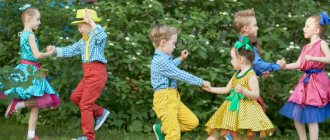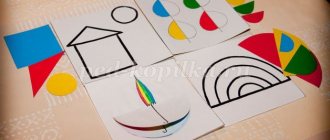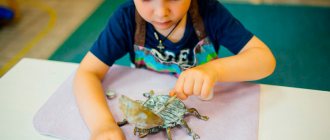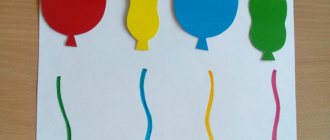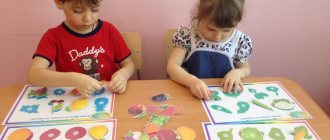Outdoor games
Outdoor games for children are useful because they develop reaction, dexterity, endurance, coordination of movements, and add extreme sports. For preschoolers 5-6 years old, outdoor play lasts 20-25 minutes. This type of play allows children to release the energy that accumulates throughout the day.
In kindergartens, after an active daytime walk, children go to bed during nap time without any problems. This practice can be used at home when you want to put your baby to sleep.
- "Giant Lilliputians." When an adult says “Lilliputians,” children squat as low as possible to the ground. When they hear the word “giants,” they rise up on their toes and stretch their arms high up. Make the task more difficult and deliberately confuse the child by calling out a word and showing the wrong movement. Playing at a fast pace will help your baby be more attentive and focused, and will also strengthen his leg muscles.
- “Do the opposite.” For six-year-old children, this game will be a real challenge to train attention. The adult shows the movements, and the child must come up with the opposite version. If the presenter jumps, the participant in the game sits down. If the leader puts his hands forward, the participant hides them, and so on.
- "Dance Marathon" Organize a dance marathon for the whole family. To do this you will need a good mood, energetic music and at least 2 participants. To diversify the game, the adult stops the music, and the children freeze in the position in which they remain. Musical games improve mood, relieve fatigue and strengthen the relationship between parent and child.
Board games
For children 5-6 years old, board games are a fun activity. This type of game teaches the child to act according to the rules, wait for his turn, and be able to negotiate. Board games always have some paraphernalia that you can touch: cubes, puzzles, figurines. Tactile contact with them develops not only curiosity, but also fine motor skills of the child.
There are board games that are more suitable for girls, for example, with heroines of fairy tales. It is also important to select boards for boys taking into account their interests.
- "Jenga". A popular game that develops fine motor skills. Suitable for adults and children. It is a set of wooden blocks. The game begins with the construction of a tower of 3 bars, 3 more bars are placed on top, but in a different direction, and so on with the entire set. When the tower is built, participants take out the block with one hand so that nothing collapses. The elongated block is placed on top of the tower. The loser is the one after whose move the tower collapses.
- "Monopoly". The game exists in various variations. Choose children's monopoly for children aged 5 years and older. Number of participants – from 2 to 4 people. The main benefit of a monopoly is that it allows you to learn economics skills. All players take turns passing through the playing field. The roll of the die determines how many steps the participant must take. The winner is the one who achieves the bankruptcy of other players and becomes a monopolist.
Educational games
Educational games for children develop mental processes: memory, thinking, imagination. The purpose of an educational game is to teach a child the knowledge, skills, and actions necessary for further development.
For learning to read and write
Learning to read and write begins with the child's introduction to letters and sounds. When a preschooler learns to hear individual sounds in a word, then he will be able to write. You can develop this skill with the help of games:
- “Name words starting with the letter...”: the adult names the letter, and the child selects as many words as possible that begin with this letter. At the initial stage, use pictures with images of words to help.
- “Find the letter”: an adult shows pictures of letters in different fonts and sizes. The child must find the letter that was given. With the help of visual memory, the preschooler will remember what letters look like and will be able to write them independently.
For teaching mathematics
Mathematical games help children 5-6 years old prepare for school. Introduction to mathematics begins with learning numbers, counting, and then calculations. It will be easier for your child to master mathematical concepts if you choose entertaining games.
- "Geometric figures". The game with a 5-year-old child is aimed at developing knowledge of geometric shapes that can be cut out of cardboard. The adult names the figure, and the child chooses it from among the other figures. At the end of the game, build a house or any other figure together.
- “Tell me what number is missing?” A game for children who can consistently count to 20. It is necessary to insert the missing numbers that come before, between or after the given number.
To teach retelling
The ability to retell texts must be trained from preschool age. Do this while doing household chores. Let the child tell you what happened in his favorite cartoon or book. To diversify children's activities, use games for five-year-olds and six-year-olds.
- "Theater at home" Choose a fairy tale that your child likes. Assign roles and stage a theatrical performance. Children really enjoy trying on the roles of their favorite characters, so remembering the script will not be difficult. This activity will teach the child not only to remember and retell the text, but also make his speech expressive.
- "Letter from a forest dweller." For five-year-olds, playing with an imaginary animal is a fun way to imagine how a character feels. Prepare a set of pictures with a plot, for example, how one day in the life of a hare goes. Invite your child to compose a story based on the pictures or add your own version.


